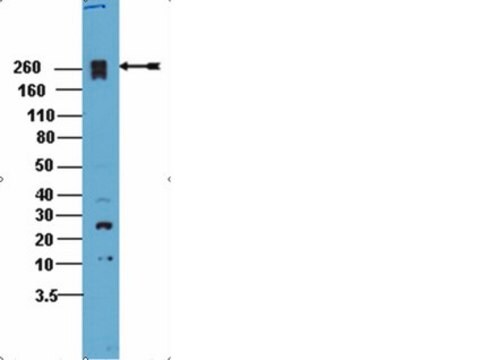ABT52
Anti-phospho-Peak Antibody (Tyr665)
from rabbit, purified by affinity chromatography
Synonym(s):
Pseudopodium-enriched atypical kinase 1, Sugen kinase 269, Tyrosine-protein kinase SgK269
About This Item
WB
western blot: suitable
Recommended Products
biological source
rabbit
Quality Level
antibody form
affinity isolated antibody
antibody product type
primary antibodies
clone
polyclonal
purified by
affinity chromatography
species reactivity
human
species reactivity (predicted by homology)
porcine (based on 100% sequence homology), rat (based on 100% sequence homology), orangutan (Sumatran; based on 100% sequence homology), mouse (based on 100% sequence homology)
technique(s)
dot blot: suitable
western blot: suitable
NCBI accession no.
UniProt accession no.
shipped in
wet ice
target post-translational modification
phosphorylation (pTyr665)
Gene Information
human ... PEAK1(79834)
General description
Specificity
Immunogen
Application
Quality
Dot Blot (Specificity) Analysis: A representative lot blocked phospho-Peak (Tyr665) in modified and non modified peptides of phosphorylated and non-phosphorlyated Peak proteins.
Target description
Analysis Note
Modified and non modified peptides of phosphorylated and non-phosphorlyated Peak proteins
Other Notes
Not finding the right product?
Try our Product Selector Tool.
Storage Class Code
12 - Non Combustible Liquids
WGK
WGK 1
Flash Point(F)
Not applicable
Flash Point(C)
Not applicable
Regulatory Listings
Regulatory Listings are mainly provided for chemical products. Only limited information can be provided here for non-chemical products. No entry means none of the components are listed. It is the user’s obligation to ensure the safe and legal use of the product.
JAN Code
ABT52:
Certificates of Analysis (COA)
Search for Certificates of Analysis (COA) by entering the products Lot/Batch Number. Lot and Batch Numbers can be found on a product’s label following the words ‘Lot’ or ‘Batch’.
Already Own This Product?
Find documentation for the products that you have recently purchased in the Document Library.
Our team of scientists has experience in all areas of research including Life Science, Material Science, Chemical Synthesis, Chromatography, Analytical and many others.
Contact Technical Service







